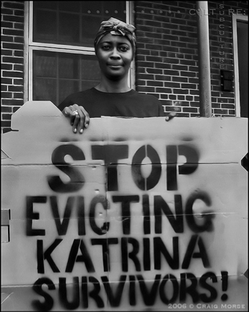U.S. human rights report fails to address the lessons of Katrina
 The Obama administration released the first-ever U.S. report to the U.N. Human Rights Council this week.
The Obama administration released the first-ever U.S. report to the U.N. Human Rights Council this week.Prepared as part of the ongoing U.N. Universal Periodic Review (UPR) process that involved consultations with civil society groups nationwide, the report [pdf] acknowledges that the U.S. human rights record is less than perfect. However, it fails to address a number of pressing human rights issues facing the nation -- including the problems experienced by U.S. residents displaced by domestic disasters like Hurricane Katrina.
"While this report demonstrates the Obama administration's willingness to recommit to engagement on international human rights, the administration must now prove that it is prepared to not only talk the talk, but also walk the walk," said Jamil Dakwar, director of the ACLU Human Rights Program.
Established by the U.N. in 2006, the UPR process assesses each member nation's adherence to human rights obligations under the U.N. Charter, the Universal Declaration of Human Rights, human rights treaties, voluntary commitments and applicable international law. The UPR process takes place every four years. This marks the first U.S. review.
The ACLU praised the report for acknowledging the need for the U.S. to improve in areas including racial justice, women's rights, LGBT rights and discrimination against Muslims and Americans of South Asian and Arab descent. However, the group criticized the report for neglecting to address other key areas where the U.S. has failed to meet its human rights obligations, including felon disfranchisement, inhumane prison conditions, racial disparities in the death penalty system and abuses in immigration detention. The ACLU also pointed out that the report defends the use of military commissions to try terrorism suspects despite the fact that such commissions pose serious human and civil rights violations.
In addition, the report fails to discuss the problems that occurred in the wake of Hurricane Katrina and their human rights implications.
Following Katrina, human rights advocates worked to raise awareness of U.S. obligations under various human rights instruments including the U.N. Guiding Principles on Internal Displacement, which sets standards for national governments to meet in the event of natural or man-made disasters that displace populations. A 2008 report by the Institute for Southern Studies documented various ways in which the government's treatment of people displaced by the Katrina disaster was not in keeping with the Guiding Principles.
In addition, the Atlanta-based U.S. Human Rights Network coordinated the preparation of 26 stakeholder reports submitted to the HRC that highlighted shortcomings in U.S. compliance. One of the reports was titled "The Human Rights Crisis in the Aftermath of Hurricane Katrina" [pdf]. Based on the contributions of a dozen Gulf-based grassroots groups, that report was coordinated by Advocates for Environmental Human Rights, a nonprofit public-interest law firm in New Orleans, and the Gulf States Human Rights Working Group, a coalition advocating for the U.S. to formally adopt the Guiding Principles as a domestic legal standard.
Given that the Obama administration's first consultation with civil society groups for its report to the HRC took place in New Orleans, human rights advocates were hopeful it would discuss human rights issues raised in Katrina's wake.
However, the administration's report to the HRC does not mention Hurricane Katrina specifically -- or domestic disaster response more generally. Its only mention of disaster comes as it discusses its efforts to use disaster relief in other countries as a way to "preserve global security" and "support the growth of global prosperity."
The HRC is scheduled to review the U.S. report in November.
(Photo by Craig Morse of Culture:Subculture photography.)
Tags
Sue Sturgis
Sue is the former editorial director of Facing South and the Institute for Southern Studies.
